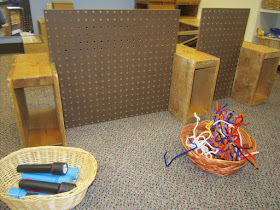Last week I posted a photo of an activity involving pipe cleaners and pegboards. Someone asked me how I came up with the idea to set up those materials in that way. The initial inspiration came from observing the children’s activities and interests. My job was to provide the materials for them to put their ideas into action.
In my two-year-old room, we have sheer fabric pieces hanging
from the back of a shelving unit, with the intention that children will use them to
hide, play peek-a-boo, or just explore the color and texture of the material. I
hung these fabric pieces by cutting small holes in them, stringing pipe cleaners
through the holes and attaching them to the pegboard back of the shelves.
One day one of the fabric pieces came loose and fell off.
Some of the children watched with interest as I worked to reattach it. They
wanted to help, and I gave them pipe cleaners that they could put through the
back of the shelving unit, but the depth of the shelves made that hard for them
to do. Plus most of the pegboard was covered in fabric, so it was hard for them
to find where the holes were. So my co-teacher and I used our observations of
the children’s activity to arrange an environment where they could explore
these materials.
We had some small pieces of pegboard (that we had used in the sensory table), but we needed a way to stand them up. We taped one
pegboard to two large hollow blocks and placed a basket of pipe cleaners
nearby. Just as we expected, the children continued the activity they had begun
while trying to help me fix the curtain, stringing and pushing the pipe
cleaners in and out of the holes in the pegboard. Unfortunately, the tape didn’t
hold, and the board fell over. We needed a new plan.
The next day, we didn’t set the pegboard in a standing
position, but left it stacked with the other blocks. One of the children tried
to stand it up, and it just happened to slide right into the slot along the
middle of the block, which kept it firmly in place. Probably without realizing
it, she had found a solution to the problem.
Several weeks passed, and we decided to set up the pegboards
again in a focal part of the room, to see if any of the children would be
interested. This time, we arranged the blocks so we could slide a pegboard into
the slots, just as we had observed a child do accidentally before. We placed a
basket of pipe cleaners nearby. The children had also recently been exploring
flashlights, so we placed those nearby as well, wondering whether children
would shine those on and through the pegboards.






No comments:
Post a Comment